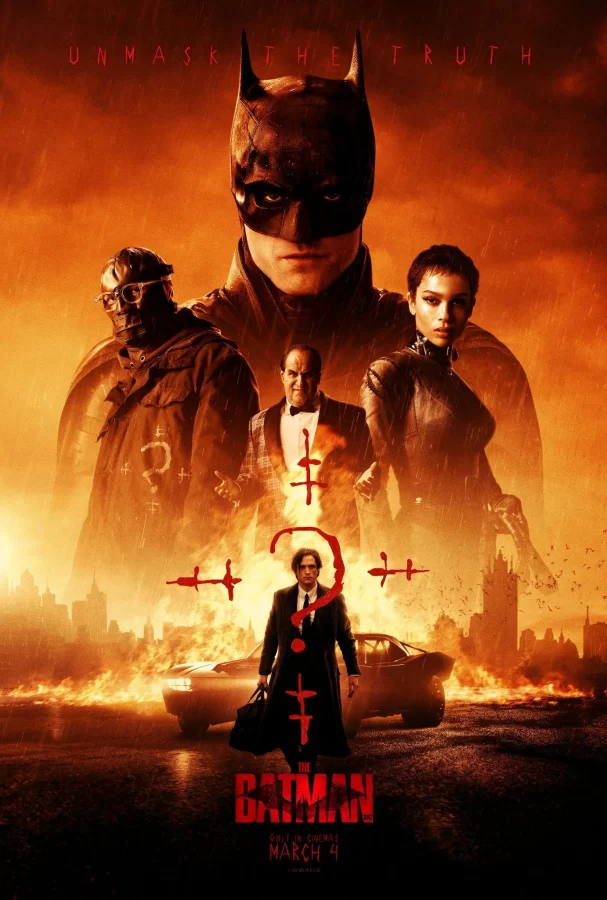Robert Pattinson’s Batman displays growth
After his sub-par role as Edward Cullen, the actor has stepped up his game
Pattinson’s performance in “The Batman” was a major improvement on past roles.
March 23, 2022
Most people — including the actor himself — can agree Robert Pattinson’s iconic role as Edward Cullen in the film “Twilight” (2008) falls considerably short of an Academy Award, including the actor himself.
Interviews criticizing his character’s cartoonish look and absurd actions — notably the scene in which he performs a cesarean section by chewing through a placenta — confirm that Pattinson despises his involvement in the franchise. He publicly bashes the series so often that a popular Tumblr account, @robertpattinsonhatingtwilight, posts his commentary under the preface “no one hates Twilight more than him”.
The portrayal is — in Pattinson’s own words — a nightmare.
Pattinson’s lack of talent cannot be the culprit of his poor “Twilight” performance when the actor has recently ended his near ten-year hiatus from mainstream roles and delivered a haunting performance in “The Batman” (2022).
Pattinson is far from the first performer to answer to the Bat-Signal. The character has progressed from Val Kilmer’s hokey hero to Christian Bale’s hard-nosed billionaire playboy, but Batman is not meant to be charming. A trauma victim who copes by toeing the line between savior and criminal ought to be haunted.
This is the premise that makes Pattinson’s performance shine: a Batman who spends the movie in his own head.
Where Cullen’s silent stares are vacant, Bruce Wayne’s carry tortured inner turmoil. As he stares after a newly orphaned child for a long moment, the audience feels the pain of each memory. When Wayne’s idolized image of his late family unravels, only minute expressions betray his anguish. The performance’s vulnerability grips fans well after the movie is over.
What changed? GQ Magazine recently released an article titled “The Metamorphosis of Robert Pattinson”, which shares the actor’s thoughts on his tumultuous career and a photograph of him bleaching his hair in a public restroom, among other attempts to break away from the past.
This alludes to what the story dubs a decade-long prison break from Pattinson’s career trajectory post-”Twilight”. He spent years starring in small, arthouse roles with singular filmmakers.
“I grew up liking classic movies,” Pattinson said to GQ. “I wanted to work with those people.” These films struck young Pattinson in a career-altering way. He veered from blockbuster flicks to rediscover why he pursued acting. This journey led him to “The Batman”.
Pattinson describes his acting process as chaotic — he feels that he must hit rock bottom before striking authenticity.
“You have to feel the pain,” the actor said to GQ. “And then suddenly it’s like God gives you a little treat.”
His portrayal of Wayne understands pain well. The traumatic death of the character’s parents spurs his descent into vigilante madness. Most people seek out a support group, but Wayne dresses up in a bat costume and takes down Gotham’s criminal underworld.
Pattinson describes Batman as a freak. Yet, assuming a disguise and hiding in the shadows is not foreign to the star — he has spent a lifetime dodging paparazzi. An interviewer once joked as Pattinson sought a hidden spot for their session, that he wanted to return to the bat cave.
The actor once shared that he uniquely alters his voice for each new character. As one journalist put it, “Pattinson seems to have long been good at being at least two things at once. An authentic singular somebody to his core. But also someone very good at pretending to be somebody else.”
This cinematic mask allows the actor to shed his personal demons and chase a greater purpose.
Similarly, Batman is a regular man until he dons the mask and becomes a symbol of hope in a lawless city. Pattinson’s performance resonates because he understands his character.
One of the film’s most powerful moments is when Wayne’s butler-confidante, Alfred, asks what his father would think of his violent gig that is damaging the family name, to which he replies, “this is my family legacy. If I don’t do this, then there’s nothing else for me.”
Pattinson said to GQ, “It’s kind of about him trying to find some element of hope in himself and not just the city.”
When asked why he accepted the role, Pattinson simply responded, “It’s a legacy part, right? I like that.”
Cullen keeps Pattinson from this legacy; Wayne allows him to chase it.














